Kia Sportage: High Pressure Fuel Pump
Repair procedures
Removal
WARNING
In case of removing the high pressure fuel pump, high pressure fuel pipe, delivery pipe, and injector, there may be injury caused by leakage of the high pressure fuel. So don't do any repair work right after engine stops.
1. Turn the ignition switch OFF and disconnect the battery negative (-) cable.
2. Release the residual pressure in fuel line (Refer to "Release Residual Pressure in Fuel Line" in this group).
CAUTION
When removing the fuel pump relay, a Diagnostic Trouble Code (DTC) may occur.
Delete the code with the GDS after completion of "Release Residual Pressure in Fuel Line" work.
3. Remove the air cleaner and the air intake hose (Refer to "Intake And Exhaust System" in EM group).
4. Disconnect the fuel pressure regulator valve connector (A)
5. Remove the ignition coil (B).
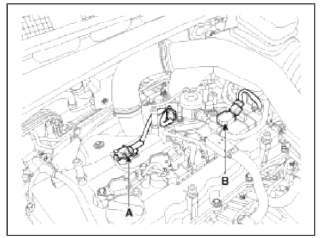
6. Disconnect the fuel feed tube quick-connector (A).
7. Remove the high pressure fuel pipe.
- Remove the installation nut (B) from the high pressure fuel pump with the special service tool [SST No.: 09314-3Q100]
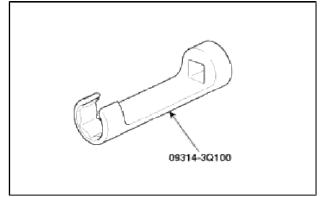
- Remove the installation nut (C) from the delivery pipe with the special service tool [SST No.: 09314-3Q100]
- Remove the purge control solenoid valve (Refer to "Purge Control Solenoid Valve" in this group).
- Remove the function block (D). and then remove the high pressure fuel pipe.
8. Remove the installation bolts (E), and then remove the high pressure fuel pump from the cylinder head assembly.
CAUTION
Unscrew in turn the two bolts in small step (0.5 turns). In case of fully unscrewing one of the two bolts with the other bolt installed, the housing surface of the cylinder head may be broken because of tension of the pump spring.
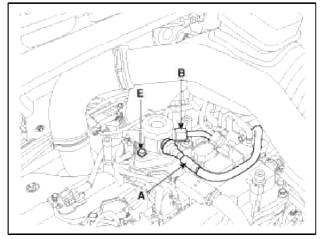
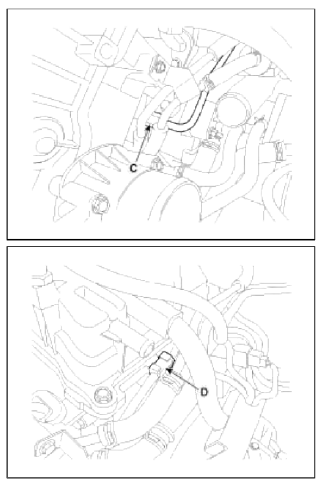
Installation
WARNING
- Be sure to check the low pressure fuel hose quick-connector (A) is completely connected to the high pressure fuel pump until a confirmation 'click' sound is heard.
- Be sure to re-check the low pressure fuel hose is completely connected to the high pressure fuel pump by pulling it after connecting.
- Be sure to install the high pressure fuel pipe (B) with the specified torques.
- Because fuel leak may cause fire, securely inspect leakage of all fuel line connection parts at engine start condition.
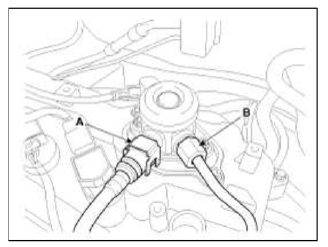
CAUTION
- Before installing the high pressure fuel pump, position the roller tappet in the lowest position by rotating the crankshaft. Otherwise the installation bolts may be broken because of tension of the pump spring.
CAUTION
- Do not reuse the used bolt.
CAUTION
- Do not reuse the used high pressure fuel pipe.
CAUTION
- When tightening the installation bolts of the high pressure fuel pump, tighten in turn the bolts in small step (0.5 turns) after tightening them with hand-screwed torque.
CAUTION
- Install the component with the specified torques.
- First hand-tighten the fasteners fully until they are not fastened
any more in order to have them inserted in place
and then completely tighten to the specified torque using a torque wrench.
If not tightening the bolts or nuts in a straight line with the mating bolt holes or fittings, it may cause a fuel leak due to broken threads.
CAUTION
- Note that internal damage may occur when the component is dropped. In this case, use it after inspecting.
CAUTION
- Apply engine oil to the О-ring (A) of the high pressure fuel pump,
the roller tappet (B), and the protrusion (C).
Also apply engine oil to the groove on the location where the protrusion (C) is installed.
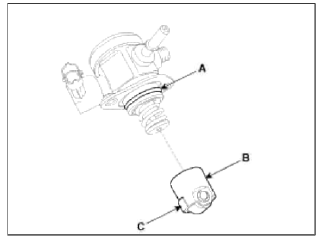
1. Installation is reverse of removal.
NOTE
Use the special service tool [SST No.: 09314-3Q100] to install the high pressure fuel pipe.
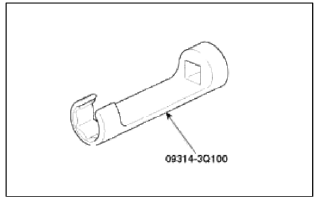
High pressure fuel pump installation bolt: 12.8 ~ 14.7 N.m (1.3 ~ 1.5 kgf.m, 9.4 ~ 10.9 lb-ft)
High pressure fuel pipe installation nut: 26.5 ~ 32.4 N.m (2.7 ~ 3.3 kgf.m. 19.5 ~ 23.9 lb-ft)
High pressure fuel pipe function block installation bolt: 7.8 ~ 11.8 N.m (0.8 ~ 1.2 kgf.m. 5.8 ~ 8.7 lb-ft)
READ NEXT:
 Identification Number Locations/Description
Identification Number Locations/Description
Identification Number Locations
Identification Number Description
Vehicle Identification Number
World Manufacturer Identifier (WMI)
KNA: Passenger vehicle, MPV (Multipurpose P
 Warning / Caution Label Locations
Warning / Caution Label Locations
Radiator cap
caution
Fan caution
Battery caution
Battery Caution Label Description
Warning / Caution Label (Cont'd)
Keep flames or sparks away from the
battery.
Wear eye
SEE MORE:
 Folding the rear seat
Folding the rear seat
The rear seatbacks may be folded to
facilitate carrying long items or to
increase the luggage capacity of the
vehicle.
WARNING
Folded Seatback
The purpose of the fold-down rear seatbacks
is to allow you to carry longer
objects that could not otherwise be
accommodated.
Never allow a pass
 Reassembly - Repair procedures
Reassembly - Repair procedures
NOTE
Thoroughly clean all parts to assembled.
Before installing the parts, apply fresh engine oil to all sliding
and rotating surfaces.
Replace all gaskets, O-rings and oil seals with new parts.
1. Assemble the piston and connecting rod.
The piston front mark and the connecting rod
Content
- Home
- Kia Sportage - Fifth generation (NQ5) - (2022-2026) - Owner's Manual
- Kia Sportage - Second generation (JEKM) (2005-2015) - Body Workshop Manual
- Kia Sportage Third generation (SL) - (2011-2016) - Service and Repair Manual
- Sitemap
- Top articles